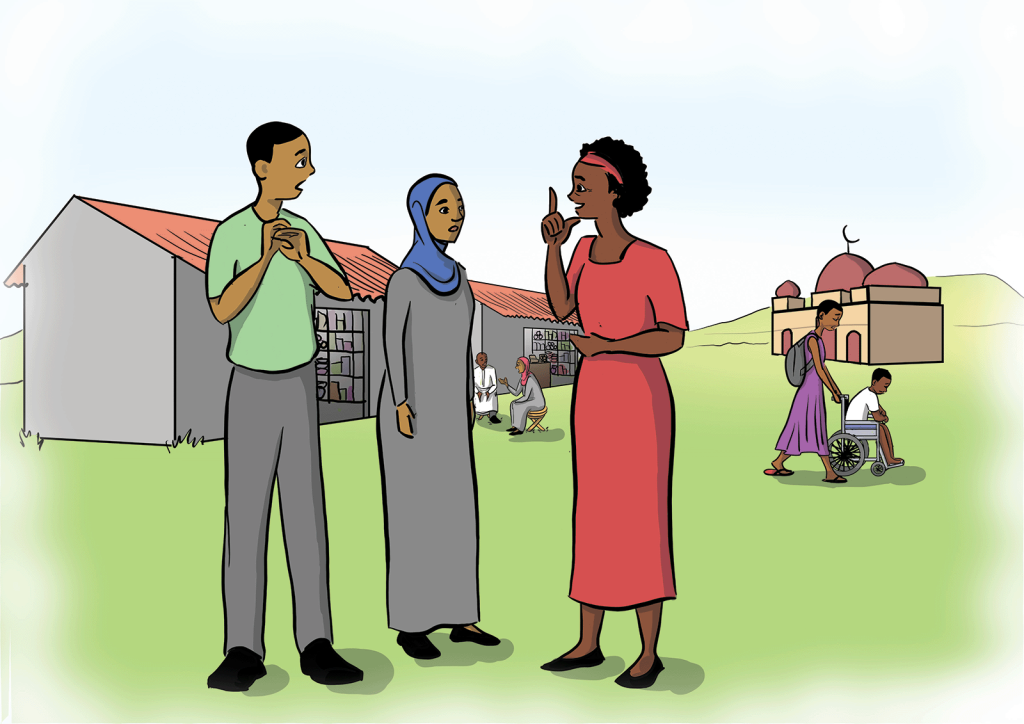Yemisi Layade
In this article, Yemisi recalls her own education journey. She reflects on how her early work experience shaped her contributions to the development of inclusive communities in Nigeria.
An introduction to teaching
When I finished secondary school, my father encouraged me to become a nurse. I failed to do this and instead, at the age of 17, began to teach in an international school. I had no formal training and learned to teach on the job.
The school was an inclusive school, in particular for hearing impaired children as the owner’s daughters were deaf. I quickly became friends with the owner and learned to sign to communicate with her two girls. The owner was impressed with my progress in the langauge and asked me to teach a class of deaf students.
The sign language used in Nigeria is based on American Sign Language. Once you have the alphabet and numbers you can start to communicate. The students became my teachers, using spelling to help me learn signs for words and phrases. Again, I learned sign language on the job.
Being a television presenter
I enjoyed learning sign language, so decided to study linguistics at university in Ekiti State. I also wanted to improve the situation for deaf students in my country. My lecturer recommended me to the state broadcasting company, and after four years of asking, I was given my own show teaching sign language. This was an opportunity to teach people sign language, even though I was not paid.
I wanted to get sign language out there and put deaf people on the map. In Nigeria many people still think that deafness is a myth, so I wanted to raise awareness. The programme was broadcast weekly. I developed lessons that progressed from learning finger spelling to more complex signs.
Graduates in Nigeria do a year of National Service. I was posted to Uyo, the capital city of Akwa Ibom State. Once there, I approached the Akwa Ibom Broadcasting Company and was taken on to do the same thing as I had done in Ekiti as part of my national service.

Developing networks
Deaf people who saw me on television began to ask for assistance to develop a spotlight on deaf communities in other states. I attended deaf community meetings and began intrepreting for them at events like church services (town hall meetings, capacity building seminars and so on).
As part of my National Service, I also volunteered for an NGO helping enable young people to access support and funding for business development after completing education and training. Afterwards, I took up a post on their monitoring and evaluation team.
I suggested to the charity head that our events should be more inclusive. Although the organisation worked with all young people – such as street-connected youth, youth with disabilities, young men and young women – I felt that it was important to have sign language interpretation. The argument for not using interpreters was the expense.
Smaller organisations often struggle to pay for interpreters while larger organisations do not always see the value of paying for interpretation. I offered to interpret at events as part of my role, which continued when I became a full-time staff member. I was happy doing it, but it was hard. Normally a 4-5-hour event would have multiple intrepreters so they can take breaks, but I had to interpret on my own. (Though the situation is now much better as the organisation now has various paid interpreters and even have a deaf employee on their team).
Inclusive monitoring and evaluation
Many organisations struggle to include people with disabilities in their monitoring and evaluation (M&E). M&E focuses on targets set by donors, often leaving little room for change or adaptation to the local context. This includes sorting data by disability. As such, it is often difficult to focus on specific groups of people, and funding/space does not always enable creativity. I developed my reporting to include a greater disability focus anyway, which was noted by the donor and hopefully changed their perspective.
I decided to take my learning to more organisations. I attended an event academy to learn more about event management so I could help different organisations develop more inclusive approaches. Since the pandemic, I have partnered with organisations to teach their staff sign language, deliver inclusion training and run events such as dances and spelling competitions. ‘Deaf Can Dance’ and ‘Deaf Spelling Bee’ are great events, for example. I work as an interpreter, inclusion advocate, event manager and in marketing.
I decided to learn more about policy and inclusive cultures and where my work fits in the bigger picture of inclusion. I would like to work towards improving access to education and training for deaf learners. To improve opportunities, it is important to understand inclusive cultures and policies, so I am completing a master’s in inclusive education, as education does not happen in a vacuum. It is important to understand the contexts within which education and indeed society takes place.
I aim to change the ways in which deaf children are viewed – promoting opportunities for them to dance, ride bikes, and go to school. Deaf people can read, and they can spell even if you can’t understand their writing because they write how they sign. We need to rethink how we understand literacy. We need to provide education in a way that fits learners’ needs and adapts to their skills. It is important that they are given the voice to decide their futures and the educational pathways that will lead them there. I would like to support the development of an association of deaf young people – indeed all young people – to help them get to be who they are.
Yemisi is currently a master’s student at Manchester Metropolitan University. She can be contacted via the EENET office.
